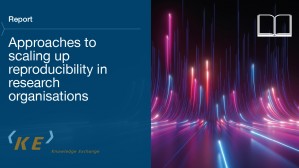
This work defines "alternative publishing platforms" as innovative channels for scholarly communication that operate outside traditional book and journal publishing frameworks. These platforms may distinguish themselves in various ways: some embrace a broader disciplinary scope or accommodate more diverse publication types than conventional outlets, while others might publish submitted versions and preprints by default. Some feature open peer review processes or seek to reform mainstream peer review approaches, and most emphasise free access to content, transparency and research efficiency.
Each platform typically combines several of these (and other) features to create its unique approach to scholarly communication, creating significant diversity and variation in strategies. Examples may include Octopus, F1000Research, ResearchEquals and PeerCommunity Journal, although this is an evolving landscape and there isn't a unique definition of alternative publishing platforms that is widely adopted.
Why we are working on this
This work directly supports Knowledge Exchange's broader strategy on innovation in scholarly communication and the KE Open Scholarship Framework. The timing is particularly significant given the growing political momentum for reforming academic publishing across Europe and recent policy developments that reflect increasing dissatisfaction with traditional APC-based publishing models.
As national organisations responsible for research infrastructure and policy in their respective countries, KE partners are uniquely positioned to guide their research communities through this evolving landscape: by examining alternative platforms, this project aims to provide evidence-based guidance that institutions, funders and researchers can use to navigate beyond established publishing paradigms.
From concept to deep dives
Building on their earlier scoping report, the KE Task and Finish Group is now diving deeper into how innovative publishing platforms can help reshape scholarly communication. The research questions are practical ones: What do funders need to consider when supporting these platforms? What makes researchers actually want to use them? And what can we learn from both successes and failures in this space?
The project brings together leads from several European organisations Anna Mette Morthorst (DeiC), Sebastian Brandt (DFG), Xenia van Edig (TIB) and Jean-François Lutz (University of Lorraine) along with Research Consulting and academic advisor Professor Stephen Pinfield from the University of Sheffield. This core group is supported by a broader international Task and Finish Group, to ensure that different perspectives and variation across the countries represented within KE and beyond are examined as part of project activities.
By publishing the research question and approach via Octopus rather than in a traditional format, the team is looking to experience alternative publishing firsthand. This platform allows research to be shared in the form of interconnected micro-publications, each of which is available openly and can be reviewed, cited and reused by others.
The use of Octopus as a publishing platform aligns with KE's commitment to openness, transparency and rapid sharing of information throughout the process. It also allows us to not only study but actively participate in the alternative publishing ecosystem we are researching.
Get involved
You can view the published information on Octopus and contact Katie Fraser (Senior Consultant, Research Consulting). We are actively seeking input from researchers, funders and alternative publishing platforms, so do get in touch if you would like to get involved!
This project will lead to the development of a public report, which we are expecting to release in 2026. Sign up to the Knowledge Exchange newsletter if you would like to be notified about this
KE APP T&F Group members
- Daniel Beucke, Göttingen State and University Library, GER
- Alexandra Freeman, Director of Octopus, UK
- Janne-Tuomas Seppänen, University of Jyväskylä, FI
- Rasmus Rindom Riise, Royal Danish Library, Copenhagen University Library, DK
- Claus Rosenkrantz Hansen, Copenhagen Business School, DK
- Bianca Kramer, Sesame Open Science, NL









